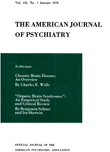Abstract
In the disposition of the case of this murderer the Law and the State turned to psychiatry for assistance for a variey of purposes. 1. The Court ordered a psychiatric examination to determine Cooper's competency to stand trial; 2. State-appointed psychiatrists conducted an examination under the Briggs Law to satisfy the State that Cooper was not suffering from any mental illness that affected his criminal responsibility; 3. Defense psychiatrists and a psychologist examined Cooper to prepare the only possible defense, "non-responsibility"; 4. The contradictory assessments of the competing psychiatrists were presented to judge and jury in the form of direct and cross-examination ; 5. The jurymen on the basis of the judge's charge and their own sentiments and observations were meant to sift through the complexities and arrive at a decision; 6. The State, after conviction, turned once again to psychiatry to seek support for a decision to reverse the directive of the jury.
The result in this case would have been no different if the 9 psychiatrists and 3 psychologists had not been involved. Cooper would have been convicted and probably would have committed suicide.
If this case is at all typical of the current state of misunderstanding and confusion between law and psychiatry, as well as reflecting the dissension among psychiatrists, I seriously doubt the value of the psychiatrists' participation in any stage of the legal proceedings. I would not question the value of the psychiatrist to weed out the grossly disturbed offender in the pre-trial competency examination but why not let the law have its own archaic way with the rest.
In the Cooper case the State used one set of psychiatrists to prove that Cooper was "perfectly sane" and therefore "responsible" and the defense, other psychiatrists, to show that Cooper was sick and therefore "not responsible." The lay jury chose the testimony it could understand and which corresponded with their own sentiments and Cooper was convicted of a murder he admitted. The only flaw in this successful manipulation of psychiatric expertise was the State's ambivalence. Since there was much moral sentiment against capital punishment Cooper could not be executed and State proceeded to use its first team of psychiatrists to rationalize the decision not to execute.
The psychiatrists and psychologists used after trial had more in common professionally with the defense experts than they did with their colleagues who conducted the Briggs Law examination and testified at trial. If this group had done the pre-trial examinations and presented their testimony to the Court, Cooper might never have been convicted but rather received the treatment he obviously needed.
The Briggs Law examiners and the posttrial psychiatrists were all employees of the Department of Mental Health of the State. The defense experts were also paid by the State. Since Cooper had no money the State paid the defense psychiatrists $350 each. The Briggs Law experts each received $7 for their examination in addition to their regular salaries as state hospital superintendents.
While it is perhaps out of place for me as a lawyer to talk of rational Utopias I would like to suggest to you my alternative to some of the modish verbal formulas. I do not believe it is the particular technical phrasing of the test of criminal responsibility that is important. What is important is the feeling these words convey about the Court's attitude toward the offender. If the Durham test has any meaning it is the substitution of the feeling, "crime may be the result of sickness," for the feeling that, "crime is the result of conscious evil." If, however, psychiatrists feel that many crimes are motivated by mental illness the need for change is much greater than the call for a revised test of criminal responsibility. The explanation of a crime to a jury by a competent psychiatrist may be too complex both intellectually and emotionally for a jury to understand and act on. I suggest to you that a jury trial is not an appropriate forum for the presentation of psychiatric explanations of behavior. The function of a jury in a murder trial should be limited to a finding that an accused did or did not commit the offense charged. Once guilt is established, a Sentencing Authority composed in part of psychiatrists and other professionally trained people, should, in the absence of capital punishment, decide what combination of treatment and/or punishment is appropriate to the individual offender.
Several months before his suicide Cooper wrote a poem which is not only particularly appropriate in expressing his feelings about himself, but also has some relevance to the procedure by which his case was handled.

